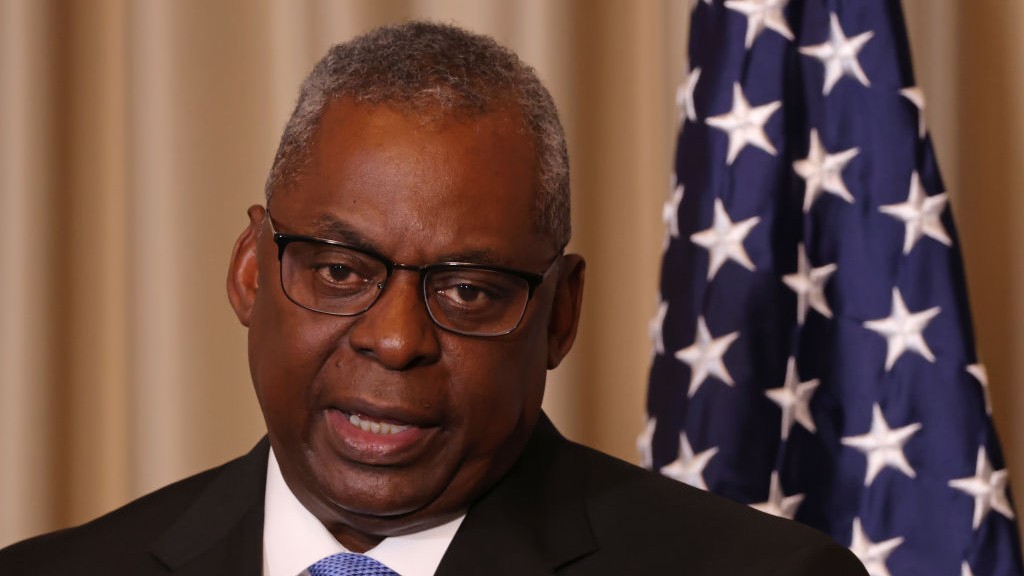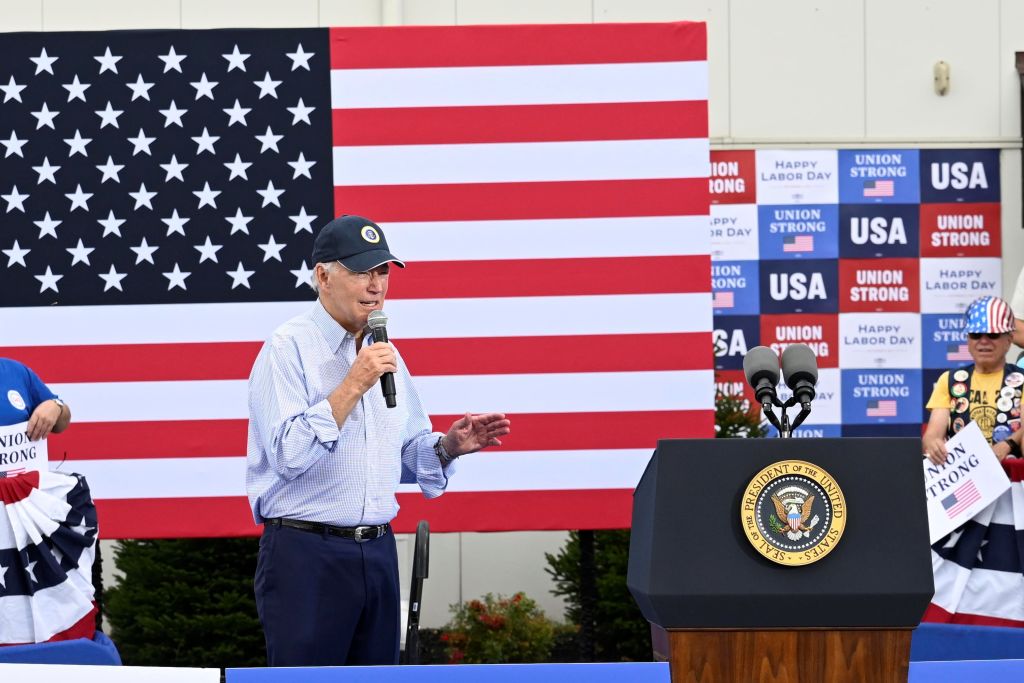Instant Opinion: he called Donald Trump’s 2016 win and ‘now he’s ready to call 2020’
Your guide to the best columns and commentary on Wednesday 5 August

A free daily email with the biggest news stories of the day – and the best features from TheWeek.com
You are now subscribed
Your newsletter sign-up was successful
The Week’s daily round-up highlights the five best opinion pieces from across the British and international media, with excerpts from each.
1. Allan Lichtman in The New York Times
on the outcome of the 2020 US election
The Week
Escape your echo chamber. Get the facts behind the news, plus analysis from multiple perspectives.

Sign up for The Week's Free Newsletters
From our morning news briefing to a weekly Good News Newsletter, get the best of The Week delivered directly to your inbox.
From our morning news briefing to a weekly Good News Newsletter, get the best of The Week delivered directly to your inbox.
He Predicted Trump’s Win in 2016. Now He’s Ready to Call 2020
“Right now, polls say Joe Biden has a healthy lead over President Trump. But we’ve been here before (cue 2016), and the polls were, frankly, wrong. One man, however, was not. The historian Allan Lichtman was the lonely forecaster who predicted Mr. Trump’s victory in 2016 — and also prophesied the president would be impeached. That’s two for two. But Professor Lichtman’s record goes much deeper. In 1980, he developed a presidential prediction model that retrospectively accounted for 120 years of U.S. election history. Over the past four decades, his system has accurately called presidential victors, from Ronald Reagan in ’84 to, well, Mr. Trump in 2016.”
Follow the link to watch Lichtman’s video op-ed.
2. Con Coughlin in The Daily Telegraph
A free daily email with the biggest news stories of the day – and the best features from TheWeek.com
on the new ‘cold war’
Useful idiots like Jeremy Corbyn are making the lives of Britain’s enemies easier
“Given the questionable company Jeremy Corbyn has kept throughout his political career, it is no surprise that he should find himself at the centre of a Russian email-hacking scandal... [And] the recent political controversy over the Chinese telecoms giant Huawei has exposed an array of senior political and business figures who appear quite comfortable defending the interests of Beijing’s communist rulers. Indeed, it is entirely feasible that Britain’s sizeable pro-Beijing lobbying community would have succeeded in protecting Huawei’s stake in the country’s 5G network, with all the implications that would have had for our national security, had it not been for the intense pressure Downing Street came under from Washington to end the company’s involvement. It is crucial, therefore, that we do not underestimate the importance of useful idiots like Mr Corbyn in helping hostile states like Russia and China to achieve their nefarious objectives.”
3. Robert Fisk in The Independent
on the explosion in Lebanon
Beirut has suffered a catastrophe that will live long in the memory – and the repeated betrayal of its citizens is a travesty
“There are some moments in a nation’s history which are frozen forever. They may not be the worst catastrophes that have overwhelmed its people. Nor the most political. But they capture a society’s endless tragedy. Pompeii comes to mind, its Roman confidence and imperial corruption suddenly overwhelmed by an act of God – so calamitous that for ever afterwards we can see its citizens’ ruin, even their bodies. It needs an image, something which can focus our attention in a mere second on the folly which lies behind a human calamity. Lebanon has just provided that moment. It’s not the numbers that matter in that context. Beirut’s suffering on Tuesday does not come close to a casual bloodbath in its civil war – nor the often daily savagery of death in Syria for that matter... It’s the iconography that will be remembered – and what we all know this represents – and what we all know this represents. In a land which can scarcely cope with a pandemic, exists under the shadow of conflict, faces starvation and awaits extinction. The twin clouds over Beirut, the one obscenely giving birth to the monstrous other, will never be erased.”
4. Ravindra Gupta, professor of clinical microbiology at University of Cambridge, and Dami Collier, infectious diseases clinician at University College London, in The Guardian
on the UK’s new 90-minute tests
Why is the government buying Covid tests without evidence they work?
“Many of us working in NHS hospitals welcomed the news earlier this week that the government had purchased 90-minute Covid-19 tests. Rapid swab tests, called LamPORE, and 5,000 machines, supplied by DnaNudge, will soon be available in adult care settings and laboratories. If they’re effective, they could allow for rapid, on-the-spot testing. But there’s no publicly available data about the accuracy of these tests or how they perform, raising concerns about why the government has endorsed – and purchased - them... Public funds have been used to purchase these tests, so transparency about their effectiveness is really important. Recent experience where the government purchased millions of sub-optimal antibody tests before they had been robustly evaluated shows the danger of purchasing equipment on the basis of manufacturers’ claims alone. We may be entering an era of trade-offs, where the accuracy of tests is balanced against the number of tests we can achieve.”
5. Roger Boyes in The Times
on weapon tests in orbit
The world risks sleepwalking into a space war
“There is a pressing need to establish basic codes of conduct in outer space. What happens up there has an immediate impact down here. It is too crowded a place for Russia and China to charge around as if it’s an extension of the Wild East. There are talks in Vienna and Russia has put forward the idea of a treaty on “the prevention of placement of weapons in outer space”. And it wants a ban on the ‘first placement’ of weapons. That has been couched to sound reasonable. But it overlooks that Vladimir Putin’s regime has been developing ground-based anti-satellite technology. It has mobile lasers that can dazzle the satellites of other states. The fact is that Russia and China are only interested in creating new norms if they serve to bind and contain the US, which remains the dominant force in space.”
-
 Heated Rivalry, Bridgerton and why sex still sells on TV
Heated Rivalry, Bridgerton and why sex still sells on TVTalking Point Gen Z – often stereotyped as prudish and puritanical – are attracted to authenticity
-
 Sean Bean brings ‘charisma’ and warmth to Get Birding
Sean Bean brings ‘charisma’ and warmth to Get BirdingThe Week Recommends Surprise new host of RSPB’s birdwatching podcast is a hit
-
 Film reviews: ‘Send Help’ and ‘Private Life’
Film reviews: ‘Send Help’ and ‘Private Life’Feature An office doormat is stranded alone with her awful boss and a frazzled therapist turns amateur murder investigator
-
 10 things you need to know today: January 7, 2024
10 things you need to know today: January 7, 2024Daily Briefing White House reportedly left unaware of defense secretary’s hospitalization, Biden to deliver State of the Union address on March 7, and more
-
 Row over pole-dancing skeleton
Row over pole-dancing skeletonTall Tales And other stories from the stranger side of life
-
 Flies attack Donald Trump
Flies attack Donald TrumpTall Tales And other stories from the stranger side of life
-
 10 things you need to know today: September 5, 2023
10 things you need to know today: September 5, 2023Daily Briefing President Biden courts unions on Labor Day, thousands leave Burning Man after being trapped by desert mud, and more
-
 ‘Irony’ as Zoom calls staff back to office
‘Irony’ as Zoom calls staff back to officefeature And other stories from the stranger side of life
-
 A country still in crisis: Lebanon three years on from Beirut blast
A country still in crisis: Lebanon three years on from Beirut blastfeature Political, economic and criminal dramas are causing a damaging stalemate in the Middle East nation
-
 Donald Trump criminal charges for 6 January could strain 2024 candidacy
Donald Trump criminal charges for 6 January could strain 2024 candidacySpeed Read Former president’s ‘pettifoggery’ won’t work well at trial, said analyst
-
 UFO hearing: why is Washington suddenly embracing aliens?
UFO hearing: why is Washington suddenly embracing aliens?Today's Big Question Speculation of extraterrestrial life has moved from ‘conspiracy fringe’ to Congress